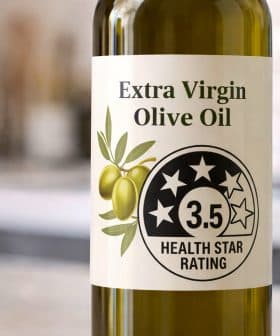FDA Allows Cardiovascular Health on Olive Oil Labels
A new 'qualified health claim' allows bottlers to say that their product improves heart health if consumed instead of animal-based fats.
The FDA has approved a new “qualified health claim” for olive oil bottles, allowing manufacturers to advertise their product as a heart-healthy alternative to animal-based fats. The claim is based on scientific evidence suggesting that daily consumption of oils high in oleic acid may reduce the risk of coronary heart disease, and the FDA hopes these labels will encourage people to make healthier food choices to reduce rates of chronic illnesses.
The United States Food and Drug Administration (FDA) announced that it will allow all olive oil bottles to carry a new “qualified health claim” on their labels.
Olive oil manufacturers may now choose to advertise their product as a heart-healthy alternative to animal-based fats for cooking and food preparation.
“Supportive but not conclusive scientific evidence suggests that daily consumption of about 1.5 tablespoons of oils containing high levels of oleic acid, may reduce the risk of coronary heart disease,” Scott Gottlieb, the head of the agency, wrote in a blog post.
“The claim will also need to make it clear that to achieve this benefit, these oils should replace fats and oils higher in saturated fat and not increase the total number of calories you eat in a day,” he added.
Along with olive oil, certain types of algal, canola, safflower and sunflower oils will also be allowed the use the qualified claim.
Joseph R Profaci, the executive director of the North American Olive Oil Association, told Olive Oil Times that in spite of olive oil already having its own qualified health claim, he is encouraged by the proactive steps taken by the current administration to adopt these types of regulations.
“Olive oil has had its own qualified health claim for years, [but] very few companies have used it because it requires a pretty extensive disclaimer, and label space is at a premium,” he said.
“What I do find encouraging about the announcement is that it indicates a willingness on the part of the current administration at the FDA to adopt changes and regulations that help inform consumers to make choices about their health,” Profaci added. “We are hoping that will translate into a willingness to adopt a standard of identity for olive oils in the near future.”
The FDA made the announcement on Monday in response to a petition sent to the agency by Corbion Biotech, Inc, but stopped short of allowing these oils to use an “authorized health claim” on their labels, which requires “significant scientific agreement.”
“FDA evaluated the scientific evidence provided with the petition and other evidence related to [the] proposed claim,” Douglas Balentine, the director of the Office of Nutrition and Food Labeling at the Center for Food Safety and Applied Nutrition, wrote in response to the petition.
“Based on this review, FDA determined that the scientific evidence supporting the proposed health claim did not meet the ‘significant scientific agreement’ standard under the Act for conventional foods,” he added.
The FDA reviewed seven small studies while making its determination, of which six indicated participants who replaced animal fats with high-oleic oils had a reduced risk for coronary heart disease.
“The science behind the new qualified health claim for oleic acid, while not conclusive, is promising,” Gottlieb wrote.
“Six of the studies found that those who were randomly assigned to consume diets containing oils with high levels of oleic acid as a replacement to fats and oils higher in saturated fat experienced a modest lowering in their total cholesterol and heart-damaging low-density lipoprotein (LDL) cholesterol levels compared to those who ate a more Western-style diet that was higher in saturated fat.”
The government is allowing health labels such as these with the hope that they will encourage people to eat more nutritious and healthy foods and that, in turn, will help to drive down rates of chronic illnesses associated with poor diets, including Type 2 diabetes, obesity and even cancer.
“Consumers should have access to clear, transparent food labels that enable them to make smart choices that benefit themselves and their families,” Gottlieb concluded.









